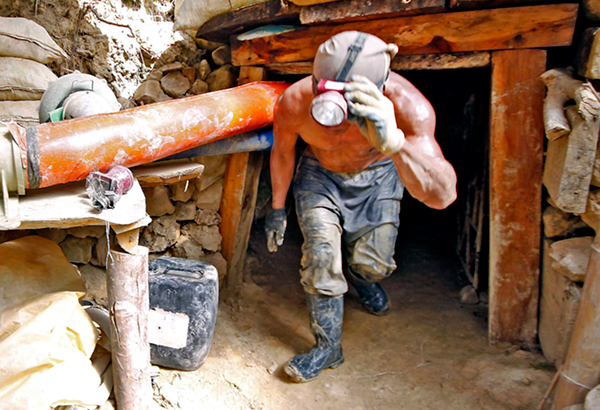Commentary: Miners, protesters must share a common objective

A small-scale miner takes a break from extracting gold in the village of Gumatdang in Itogon, Benguet. More than 60 percent of Gumatdang’s residents are engaged in small-scale mining. The STAR/Artemio Dumlao, File photo
This week’s mining conference has shown how much work is still needed to heal the relationships between some mining companies and the communities that host their operations. Just yesterday, protesters turned up outside the conference to air their grievances on irresponsible mining outfits. It’s an unfortunate state of affairs for the Chamber of Mines of the Philippines (COMP), which organized the meeting on the theme “Responsible Mining: Moving Beyond Compliance.”
Despite the departure of Gina Lopez as Environment secretary, the rest of 2017 has not turned out too positively for the mining industry. Barraged with complaints and the threat of new strangulating regulations, the good eggs in the industry must be fed up with being lumped together with erring businessmen. Their bad business practices only make it harder for any legitimate actor to succeed.
For the good miners out there, now is the time to prove to the government and to all stakeholders that responsible mining is not only possible, it is being practiced. This is a time for COMP, as the industry’s leader, to ensure that its members practice what they preach. If the industry can show that it has the wherewithal to police its own ranks, it may be able to overcome its negative image and all the challenges that emanate from it.
Models for responsible mining
There are several models of practice that define responsible mining by identifying standards or guiding principles to manage mining operations against. As one example, the Mining Association of Canada (MAC) has adopted assessment protocols for Aboriginal and Community Outreach, Energy and GHG Emissions Management, Tailings Management, Biodiversity Conservation Management, Safety and Health, Crisis Management and Communications Planning. Through these protocols, MAC can gauge the adherence of its members to the organization’s principle of responsible mining. Down under, the Australian government has also laid down the principles of responsible mining that might be adapted for the Philippine context: Sustainable Development, Efficiency, Precaution, Accountability and Transparency, Polluter Responsibility, Community Consultation and Involvement, and Equity and Equality.
COMP can adapt these standards, adopt them for the industry, and then assess its members according to these principles. In any case, all members of COMP should have to undergo the responsible mining assessment. This compulsory arrangement would be similar to that of MAC’s Towards Responsible Mining (TSM) program. Certification mechanisms should also be devised to reward those exhibiting excellent performance, as well as to assist those striving to meet the standards, much like that of the Initiative for Responsible Mining Assurance’s (IRMA) prospective “Certified” and “Candidate” statuses. Such an endeavor would show the industry’s reliability as a responsible and self-regulating player in our society.
Endpoint solutions
For individual mining operations, another way to ensure responsible mining is by adopting the “endpoint perspective” espoused by Dr. Carlo A. Arcilla of the University of the Philippines’ National Institute of Geological Sciences. For Arcilla, the assessment of mining projects should not be limited to their net present value, but should primarily consider the end of mine life or post-closure scenario. Such an approach would allow proponents to visualize proactive methods to address inevitable issues, such as tailings disposal, mine rehabilitation, and the sustainability of the host and surrounding communities, as mining operations wind down. These views are encapsulated in a recent study published by the Stratbase ADR Institute, entitled “Mining in the Philippines: Problems and Suggested Solutions.”
Renewed urgency
The theme “Responsible Mining: Moving Beyond Compliance” shows the industry-wide effort to emphasize responsible mining, and miners’ aim to go above and beyond mining laws and other environmental regulations in the conduct of their operations. Thankfully, the theme communicates a desire to shift from business as usual to a level of commitment that addresses mining-related environmental and socio-economic issues.
Ultimately, COMP’s repeatedly avowed adherence to mining laws is weakened or betrayed by its member and non-member miners who violate environmental regulations. Legacy concerns, such as the Marcopper disaster Marinduque, continue to haunt the industry. In this context, COMP must take on the responsibility of vouching for its members’ mines, and make a testament to how mining can be done properly in the Philippine setting. For individual operations, this undertaking will help them and the public to distinguish illegal and non-compliant operations from responsible ones. In this way, the protesters and the miners alike will share a common objective: cracking down on these delinquent miners.
Dindo Manhit is the president of think tank Stratbase Albert del Rosario Institute, a partner of Philstar.com.
- Latest





























